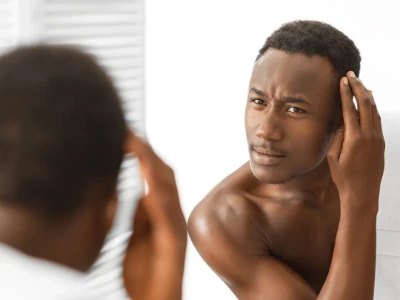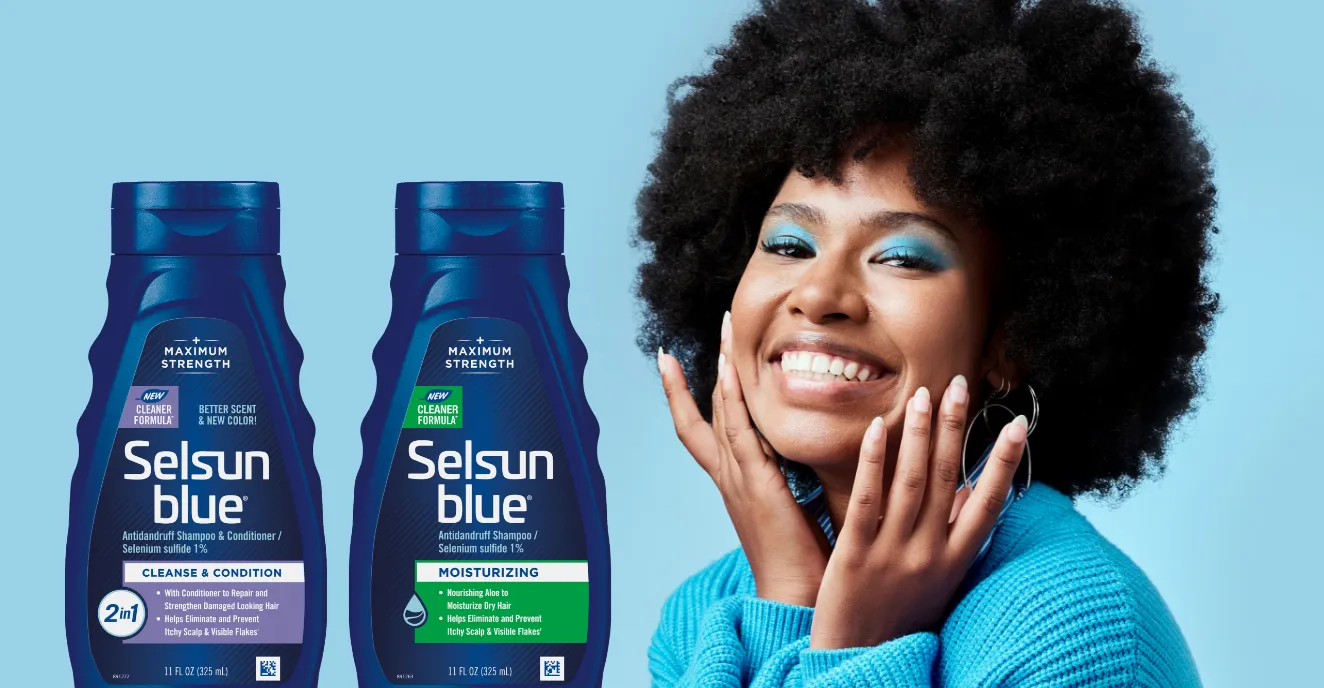How long does it take to get rid of dandruff?
2:30 MINUTE READ TIME

What is dandruff?
Dandruff is a common scalp condition that sometimes causes flaky skin and an itchy scalp. It can affect a wide variety of people at various times in their life [1].
You may already know about what it’s like to live with dandruff and how frustrating and even embarrassing that can sometimes be. Dandruff — which is basically a mild form of seborrheic dermatitis — is a common scalp condition that affects around 50% of the world’s population. Luckily the condition isn't considered serious, but it can sometimes be a challenge to treat it quickly and effectively. Don’t forget! Dandruff can affect any person at any age, although men are more likely to experience the condition than women [2].
Symptoms
Some of the signs and symptoms of dandruff may include the following:
-
Skin flakes that appear on your scalp, hair, eyebrows, beard, or mustache, and possibly your shoulders [3].
-
An itchy or irritated scalp [3].
-
A scaly or crusty scalp in infants who may be suffering from cradle cap, which can be common in young children [3].
The signs and symptoms of dandruff may sometimes be more obvious if you're feeling stressed, and they can also flare up when the weather is cold or dry [3].
Head over to our article “Do I have dandruff?” to get more information and learn more about the various symptoms.
Causes of dandruff
Don’t believe anyone who tells you that dandruff is caused by poor personal hygiene. Of course, it may look more obvious if you’re unable to wash your hair on a regular basis, but factors such as stress and exposure to cold weather can also make dandruff worse [4].
Also, there’s often more than one reason for dandruff to be a problem. These can include:
-
Irritated or oily skin [3].
-
Dry skin, either caused by seasonal weather or because that’s your normal skin condition [3].
-
A yeast-like fungus called Malassezia that can feed on oils found on the scalps of most adults [3].
-
Sensitivity to a variety of hair care products. This is known as contact dermatitis [3].
-
Other irritating skin conditions, such as psoriasis and eczema [3].
.jpg)
How long does it take to get rid of dandruff?
If dandruff doesn't get any better after 4 to 6 weeks, then try using one of our other shampoos with a different active ingredient [1].
Talking to your pharmacist can open up a whole new world of information and choices. Any questions you may have about yourself or a family member and how an anti-dandruff shampoo may help in the management of dandruff can be answered in this way [1].
How to get rid of dandruff fast
For mild dandruff, try using a gentle shampoo to reduce oil and skin cell buildup. If that doesn’t work, then try a medicated anti-dandruff shampoo. Some people can use medicated shampoo two to three times a week with regular shampoo on other days if needed [3].
Take a look at some of our anti-dandruff shampoo products below.
Selenium sulfide.
This is an anti-infective and antifungal shampoo that is used to control and manage symptoms of dandruff, as well as skin conditions such as seborrhea and tinea versicolor. It’s effective at relieving most of the symptoms caused by dandruff, especially if you use it at least twice per week [5].
.png)
Salicylic acid.
This is a topical agent that helps fight dandruff. It works by removing scaly skin and decreasing any cell-to-cell clumping. This helps to prevent any recurrence or flareup of dandruff [5].
.png)
Keratinization regulators.
Made from pyrithione zinc, they can help normalize skin keratinization. Keratinization is the process of cell formation and the exfoliation of skin cells to reduce clumping. Pyrithione zinc will also help regulate sebum production to help manage any scalp oiliness [5].
.png)
*= use as directed
Head over to our products page to see more of our products. You can also purchase our products on our “where to buy” page.
Should I switch shampoos?
Dermatologists recommend switching regular shampoo with an anti-dandruff shampoo when dandruff appears. You will need to follow a routine to control dandruff but as symptoms improve you may use dandruff shampoo less frequently [6].
If you don't start to see or feel any improvements after trying an anti-dandruff shampoo [7], try an alternative that has another active ingredient, such as salicylic acid or selenium sulfide, or one with Pyrithione zinc.
If you’re not sure which shampoo might be best to use, try our Selsun Blue® product selector.
When to see a doctor for dandruff problems
If you’re still scratching and experiencing flaking after trying some of the over-the-counter preparations available then do see your doctor. Sometimes, for really stubborn dandruff cases, you may need to try a recommended prescription shampoo or a topical solution, but make sure you get qualified advice [5].
Conclusion
Dandruff can be really frustrating, especially when you want to get rid of it quickly and effectively. The good news is that it rarely signifies a severe health issue. Dandruff can arise due to a variety of causes, but if you get the right advice and start using the right anti-dandruff shampoo for your hair type you could start to remedy those symptoms fast, leaving you with a healthy scalp and a confidence boost.
References
-
Dandruff (for Teens) - Nemours KidsHealth (2022). Available at: https://kidshealth.org/en/teens/dandruff.html (Accessed: 8 February 2022).
-
Ranganathan, S. and Manuel, F. (2011) "A new postulate on two stages of dandruff: A clinical perspective", International Journal of Trichology, 3(1), p. 3. doi: 10.4103/0974-7753.82117.
-
Dandruff - Symptoms and causes (2022). Available at: https://www.mayoclinic.org/diseasesconditions/dandruff/symptoms-causes/syc-20353850 (Accessed: 8 February 2022).
-
Dandruff (2017). Available at: https://www.nhs.uk/conditions/dandruff/ (Accessed: 8 February 2022).
-
Top dandruff shampoo ingredients to look for (2022). Available at: https://www.selsunblue.com/en-us/selsun-clinic/education/top-3-dandruff-ingredients (Accessed: 8 February 2022).
-
Dandruff | University Health Service (2022). Available at: https://uhs.umich.edu/dandruff#:~:text=Dermatologists%20recommend%20alternating%20a% 20regular,is%20important%20in%20treating%20dandruff. (Accessed: 10 February 2022).
Antidandruff . Daily use . Moisturizing . Thicker-looking hair
.webp)







